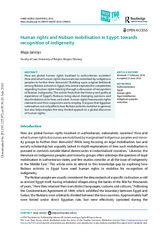| dc.contributor.author | Janmyr, Maja | |
| dc.date.accessioned | 2016-09-07T09:26:11Z | |
| dc.date.available | 2016-09-07T09:26:11Z | |
| dc.date.issued | 2016 | |
| dc.Published | Third World Quarterly 2016 | eng |
| dc.identifier.issn | 1360-2241 | |
| dc.identifier.uri | https://hdl.handle.net/1956/12743 | |
| dc.description.abstract | How are global human rights localised in authoritarian societies? How and what human rights discourses are mobilised by indigenous peoples to further their demands? Building upon original fieldwork among Nubian activists in Egypt, this article explores the complexities regarding human rights framing through a discussion of recognition of Nubian indigeneity. The article finds that the history and political experience of Egypt’s Nubians bring about diverging opinions and also limitations as to how, and what, human rights frameworks rights claimants and their supporters are to employ. It argues that Egyptian nationalism not only affects how Nubian activists mobilise in general, but also helps explain the very limited appeals to a global discourse of human rights. | en_US |
| dc.language.iso | eng | eng |
| dc.publisher | Taylor & Francis | eng |
| dc.rights | Attribution CC BY | eng |
| dc.rights.uri | http://creativecommons.org/licenses/by/4.0 | eng |
| dc.subject | Authoritarianism | eng |
| dc.subject | Egypt | eng |
| dc.subject | human rights | eng |
| dc.subject | legal mobilisation | eng |
| dc.subject | indigenous peoples | eng |
| dc.subject | minorities | eng |
| dc.title | Human rights and Nubian mobilisation in Egypt: towards recognition of indigeneity | eng |
| dc.type | Journal article | |
| dc.type | Peer reviewed | |
| dc.date.updated | 2016-07-21T07:46:14Z | |
| dc.description.version | publishedVersion | |
| dc.rights.holder | Copyright 2016 The Author | eng |
| dc.identifier.doi | https://doi.org/10.1080/01436597.2016.1206454 | |
| dc.identifier.cristin | 1368844 | |

